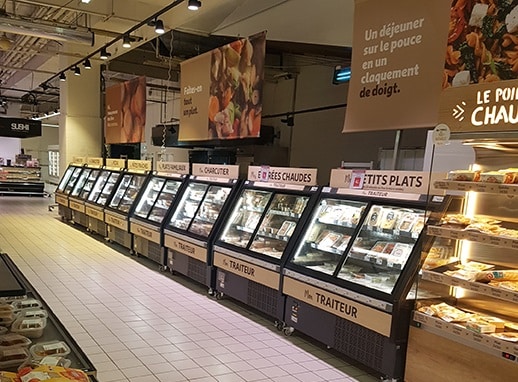Points de Vente, the retail and trade magazinei has published an article on Loca Service,
read it here: COLD FURNITURE FOR RENT: PLAYING ON SEASONALITY

For occasional or seasonal needs, supermarkets and food manufacturers are turning to refrigerated unit rental. Some players have made this their core business.”The units are ours. We’re both rental companies and manufacturers, and that’s what sets us apart. We own our refrigeration units and make them available to distributors or manufacturers, within the framework of a particular operation, for a very variable duration, from a few weeks of very short duration, to very long duration, which can be several years”, explains Maxime Sorel. To achieve this, the rental company must meet a number of constraints and processes. “One of the first things is that the rented furniture will move. When a piece of furniture is purchased, it is delivered, palletized, highly protected and placed in the store. It is not intended to be moved. Rental furniture will travel a lot. It’s going to be transported by truck to a branch in a store, then from the store to the branch, then back to another store, and so on. There are many, many movements,” he explains.
SPECIFIC DESIGN
The solidity and reinforcement of the furniture is therefore a priority right from the design stage. Then, a circuit is set up: when a piece of furniture is returned at the end of an operation, the logistics are handled internally, all the way to the branch where it is located. The latter functions as a mini-warehouse, involving several types of trades. “Today, we have 11 branches in France, so that a customer can be less than 200 kilometers from us. In addition to proximity, this means responsiveness,” he explains. The furniture is then emptied of its POS or marketing packaging, before being tested technically, mechanically and electrically. Like a car, the bodywork is inspected and repaired if necessary. The cold test can be carried out in different cycles, and the unit is finally cleaned before it is ready for a new rental. A model ultimately based on the sharing of equipment and the economy of functionality. “A piece of furniture has many lives, and our furniture has many lives,” he smiles. In fact, furniture is often an integral part of a manufacturer’s sales operation. They can’t own their own fleet of furniture, or deploy their own logistics. “That‘s the whole point of renting… Cold furniture is a profession. You have to know how to maintain it, which means calling on the expertise of refrigeration specialists, technicians, etc., who a manufacturer doesn’t necessarily have on staff”, he adds. launched by the government in… 2012.
PROMOTIONAL OPERATIONS
Rental also enables distributors and manufacturers to cover all the year’s major events: Christmas, creamery operations, Chinese New Year, and a wide variety of other events, including sports events. “Rental and promotion are one-off operations. They require a cold supply that the distributor doesn’t need on a permanent basis. In the case of ice creams, for example, no retailer sizes its store to display a hundred or more types of ice cream in summer. But from the beginning of April until October, these products must be presented to the consumer,” observes Stéphane Brindejonc, Managing Director of Arneg France. An observation shared by Adrien Salengros, Sales Director at Efficop: “Rental is an excellent solution depending on the configuration, i.e. when seasonal needs are involved. However, it costs more to rent displays than to buy them. But it does provide a service: some distributors rent a large part of their cold stock because, if a display case stops working tomorrow, it’s easy to call maintenance and change it, and that’s 0 hassle”.
LEASE WITH PURCHASE OPTION
Another trend is leasing with an option to buy, a model already widely used in other economic sectors, such as the automotive industry. “A lot of companies are being created in the French economic environment: leasing companies that own the furniture and then lease it back. If distributors can afford to invest, they might as well, but in a more difficult environment, it makes sense to lease,” remarks Stéphane Brindejonc. For his part, Adrien Salengros explains that he is “currently working with various financial institutions to offer leasing solutions to my customers. 5 years ago, a standard genset cost 2,000 or 2,500 euros. Today, it costs 3,000 euros. Admittedly, it consumes less, but still costs more. Instead of buying it, you can rent it and pay rent for 7 years. At the end, the retailer decides whether to keep the unit or rent another.
THE SECOND HAND, EVEN MORE EXPLOITED ON THE COLD
The idea of a second-hand market was also born. “The reasoning is simple: now that equipment is excellent, it should no longer be thrown away, but reused. It’s possible to keep it, to bring it up to date with a retrofit. This means that with 20% or 30% less, we can refurbish it, starting from a more aesthetically pleasing and higher-performance base, and resell it to stores that have less money, but also need good-quality equipment. Second life is certainly a solution, even if it hasn’t yet been fully developed. As distributors, we need to develop our skills,” notes Adrien Salengros, who nonetheless believes that he will be in a position to offer this type of service by summer 2024. “When we get the reconditioned equipment back in good condition – this point is non-negotiable – we’ll then be able to make someone happy in another store who, instead of buying the equipment at full price, will get it at a much lower price. Of course, there will still be the cost of refurbishment,” he explains.






